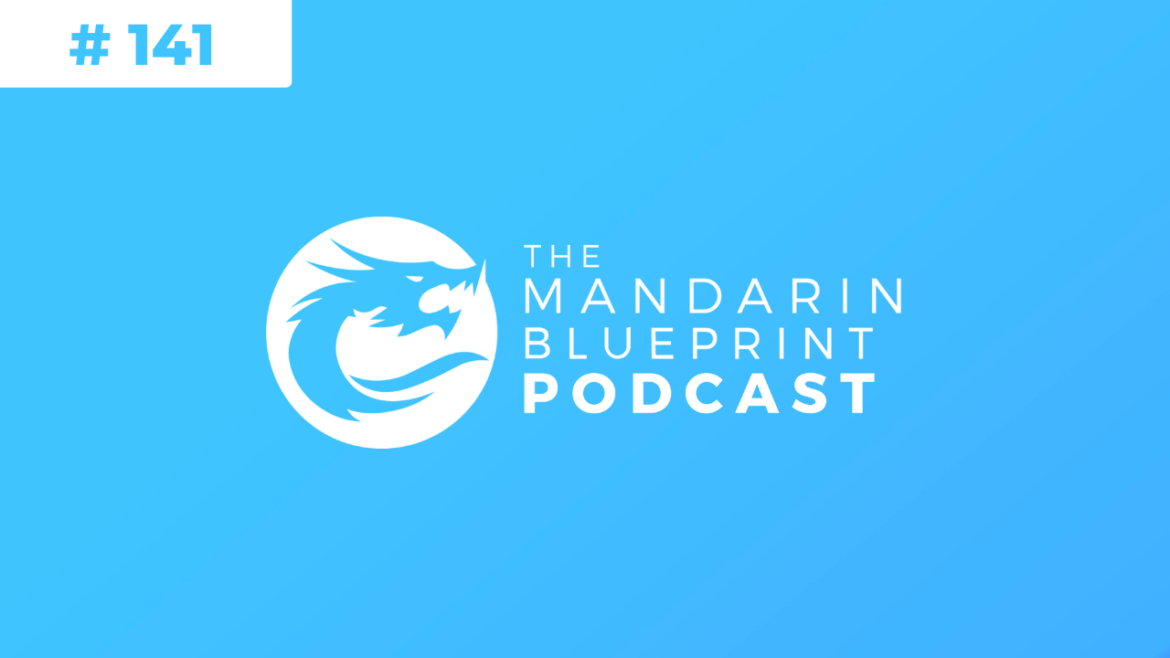欢迎光临! Welcome!
You can now subscribe to the podcast by the links below, or you can subscribe by copying the following URL into your favorite podcast APP.
The Mandarin Blueprint Podcast focuses primarily on The Blueprint online curriculum. Creators Luke Neale & Phil Crimmins answer questions and comments, discuss topics related to China and Mandarin learning, and have special guests.
Want to learn how to speak fluent Chinese fast? Join our free Webinar right here.
欢迎光临! Welcome!
You can now subscribe to the podcast on iTunes, Stitcher, Spotify, or you can subscribe by copying the following URL into your favorite podcast APP:
https://www.mandarinblueprint.com/feed/podcast/
The Mandarin Blueprint Podcast focuses primarily on The Mandarin Blueprint Method online curriculum. Creators Luke Neale & Phil Crimmins answer questions and comments, discuss topics related to China and Mandarin learning and have special guests.
0:00 Affiliate Link & Reviews
Become a Mandarin Blueprint Affiliate
Leave us a Google Business Review 🙂
9:09 Comments & Emails
Lynn Ford on Walk in the park?! I’ve got 汉字 to study!
Question, I know everyone’s learning speed is different but I feel a bit behind. I was able to read all of this and understand it all, but I am VERY slow and even at 80% have no hope of shadowing this. I have been able to do it on DuChinese newbie stories at 50%, but I struggle to keep up, even going that slow. I still pause and read like I am in 1st grade, reading each word slowly and thinking as I read. I understand this will come quicker as I progress, and practice more. However, I just want to check in that this is normal, to still be very slow at this stage now being in phase 4. Thanks!
13:15
Tina Clark on Welcome to Phase 3 – Simple Grammar
You have obviously put so much care and thought into the layout of this entire course. I am so excited for Phase 3. Bring it on!
13:35
Anne Giles on 得 in Context
I’m scheduled to take the HSK 2 exam next month, am working with some teachers, and have gotten the feedback that I don’t use the “three de’s” correctly: 的, 地, and 得. I hear you that real-life exposure to grammar through hearing Chinese spoken or reading texts is ideal. We’re still meeting rarely in person in my town and I’m learning to read as fast as I can! I’ve read some online articles but would welcome being talked through this. Thanks for considering!
18:10
Raiyan Syed on Welcome to Phase 2 – Chinese Words
I just finished level 13, where we learn 面包 as a compound word. However, because of this video, I already have a solid association with the meaning of this word ever since I heard Phil call it “noodle bag” in this video. The goofiness of it really helps it to stick in my memory.
In general, I have found remembering compound word meanings by individual characters very effective when it’s possible. Shoutouts to Luke for showing that 电影 is “electric shadow” in the PM course and Phil for showing that 老师 is “old master” and that 老婆 is “familiar woman.”
Won’t be forgetting the Mandarin words for bread, movie, teacher, and wife anytime soon!
19:43
Bruna on (BONUS) The Drawbacks of Having Bad Pronunciation
What you said about natives not able to help me with my pronunciation is so true. During my Chinese classes back in college, my teacher would ask me to stay after class to help my pronunciation. I remember once she asked me to repeat after her “xihuan” over and over again. I did like 50 times, and for the life of me, I couldnt get it right. She eventually gave up and let me go. 🙁
21:34 Vocab Living Links
This section covers “Living Link” mnemonic techniques to remember Chinese words of two or more characters. Here’s a video explaining the theory behind it.
Raiyan Syed on Vocab Unlocked from 己: 自己
Narcissus from Greek mythology and narcissism would be a good link to this, right?
23:49
Ceri Woods on Vocab Unlocked from 动: 活动 – 自动 – 运动
I used to panic a bit when I got to ‘vocab unlocked’ if I couldn’t figure out how the words fit grammatically, or if it was hard to remember that the two character combos meant more than one thing… but once I get to vocab in context it *genuinely* makes it make sense. Trust the process!
28:45
Rick Angleland on Vocab Unlocked from 情: 情况
I don’t think you mentioned this in your word mnemonics video: you can google “[word] phrases” and get a lot of English phrases using that word, and then find images for them. In this case I found “situation room”, “win-win situation” etc. which all relate to this word.
31:44 Movies!
This blog post explains the theory behind Movie Scenes and learning characters.
Ric Santos on Make a Movie 程
Ch-actor is the at kitchen (2nd tone) of the -eng set, He is dining with the king (王) . This king (王) only wants his share of the food; but is clueless of the journey (程) which the farmer (禾) goes through – from knowing & preparation of the land, planting the seeds, harvesting and marketing until food reaches the mouth (口) of the people. The king was very impressed with how the farmer (禾) detailed all the processes (程) involved. So after that, the king officially declared that farming is truly an engineering (工程) program by itself. 程.
34:18
John Nomura on Make a Movie 扰
In the LR of my ao- set: Robert Deniro (r- actor) has a ROW (rhymes with cow) with his FrankenBull (尤 ) which is DISTURBING (扰) his neighbors so he points his finger (扌) and says “请勿打扰” = do not disturb.
35:38
Christopher Weeks on Make a Movie 示
Sean Connery (sh-) is in the bathroom of my childhood home (-Ø 4th tone).
He is DISPLAYing an episode of Pingu (小) trying to use Chopsticks (二) , using a projector on the bathroom wall.
37:05
Benjamin Rees on Make a Movie 德
Danny Dyer (d) brings a big net full of hearts into the kitchen of my -e location, then leaves. Bruce Lee springs from a hiding place, and cuts open the net with a razor. He then gives each heart an adrenaline shot with a syringe, and they make their escape, bouncing away. A virtuous deed!



